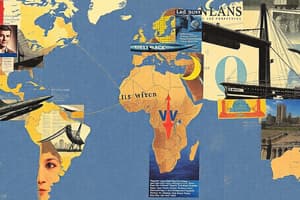Podcast
Questions and Answers
What is the 'cut-flowers thesis' according to Glenn C. Graber?
What is the 'cut-flowers thesis' according to Glenn C. Graber?
Morality cannot survive in the long run if its ties to religion are cut.
According to Leo Tolstoy, what does he compare attempting to found morality apart from religion to?
According to Leo Tolstoy, what does he compare attempting to found morality apart from religion to?
Like attempts of children who transplant a flower without roots into the ground.
Which statement best describes the relationship between morality and religion?
Which statement best describes the relationship between morality and religion?
- Morality cannot survive without a connection to religion. (correct)
- They are completely independent of each other.
- Religion is optional for moral behavior.
- Morality is irrelevant in religious contexts.
Study Notes
Globalization and Ethics
- Globalization: a process of interaction and integration among people, companies, and governments of different nations, driven by international trade and investment, aided by information technology.
- Effects of globalization: impacts on the environment, culture, political systems, economic development, and human physical well-being.
- Objective: to create a truly interrelated, interdependent, and developed global village.
Ethical Issues of Globalization
- Reduction of protectionism: unfair unless applied fairly, leading to exploitation by multinationals.
- Inequality of power: massive exploitation by multinationals, particularly in countries with weak or no trade unions.
- Gap between rich and poor: 40% of the world's population lives on less than $2 a day, receiving only 5% of the world's income.
- Economic globalization: marginalizes the poor, destroys the environment, and damages cultures.
- Increased inequality: further impoverishes the poor.
- Global problems: pollution, resource shortages, global warming, expansion of global tourism, spread of diseases, and terrorism.
- Poverty: 820 million people lack adequate nutrition, and there is a need for aid and a fairer trading system.
Solutions to Ethical Problems of Globalization
- Countries must accept shared responsibility for managing risks and assisting developing countries.
- Coordinated action: address poverty and malnutrition worldwide, support countries where outbreaks occur, and help those most at risk of infection.
- International cooperation: necessary to address global dangers such as climate change, financial crises, and rising inequality.
Millennials and Ethics
- Millennials: born between 1977 and 1995, characterized by increased use and familiarity with communications, media, and digital technologies.
- Traits: special, sheltered, confident, team-oriented, conventional, pressured, and achieving.
- Ethical outlook: open-minded, pragmatic idealists, desiring to make the world a better place, but also understanding the need to work within and outside existing institutions.
- Beliefs: support access to affordable contraception, abortion, and progressive domestic social agenda.
- Work ethics: tech-savvy, appreciative of diversity, skilled in multitasking, but also lack basic literacy fundamentals, have short attention spans, and demand immediate feedback and recognition.
Individualism and Conflict with Parents
-
Millennials: individualistic, self-directed, and focused on finding themselves, with a strong sense of independence.
-
Morality: personal and subjective, based on feeling, and nontransferable to others.
-
Conflict with parents: difference in mentality, with Baby Boomers seeing Millennials as greedy, self-absorbed, and wasteful, while Millennials are seen as denying the lifestyles of their parents.
-
Differences between Baby Boomers and Millennials: progressive social issues, political party identification, and wealth.### Millennials and Marriage
-
Millennials are more likely to marry someone of a different race, with 15% of marriages being between people of different races or ethnicities.
-
This is a significant increase from the 1960s, when less than 3% of marriages were between people of different races or ethnicities.
-
More than a quarter of Asians and Hispanics, one in six African Americans, and 10% of whites marry outside their ethnicity.
Millennials and Living Arrangements
- More Millennials live at home than their parents (Baby Boomers) did at the same age.
- Over 22% of households in the U.S. have two or more adult generations living under the same roof, a level not seen since the end of World War II.
Religion and Ethics
- Religious ethics concerns beliefs and practices of what is good or bad, right or wrong, virtuous or vicious, from a religious point of view.
- Christian ethics, for example, may be based on the teachings of Jesus Christ about loving one's neighbor, being a good Samaritan, and loving one's enemies.
Definition of Ethics and Religion
- Ethics is a system of moral principles that affect how people make decisions and lead their lives.
- Ethics is concerned with what is good and right for persons and society.
- Religion is defined as people's beliefs and opinions concerning the existence, nature, and worship of a deity or deities, and divine involvement in the universe and human life.
- The term 'religion' is sometimes used interchangeably with 'faith,' 'creed,' 'belief system,' or 'conviction.'
The Role of Religion in Ethics
- Many ethicists believe that religion is necessary for the continued survival of morality as an integral part of human life, especially in a globalized world.
- The 'cut-flowers thesis' suggests that morality cannot survive in the long run if its ties to religion are cut.
- This thesis is supported by thinkers such as Leo Tolstoy, who argued that morality is like a flower that needs roots to survive, and that without religion, morality will wither.
Studying That Suits You
Use AI to generate personalized quizzes and flashcards to suit your learning preferences.
Description
Explore the concept of globalization, its effects on the environment, culture, and economic development, and its relation to ethics and religion.




